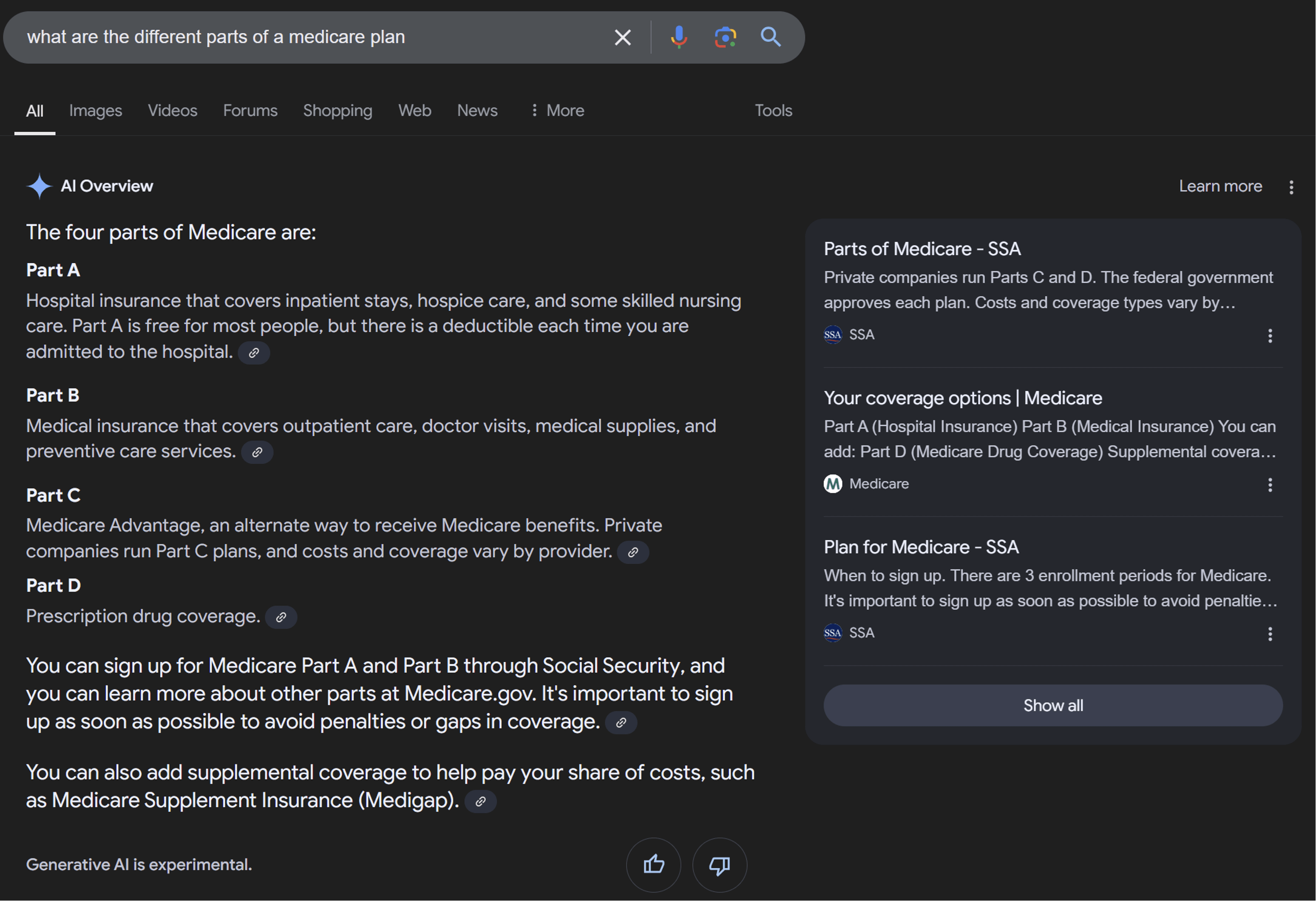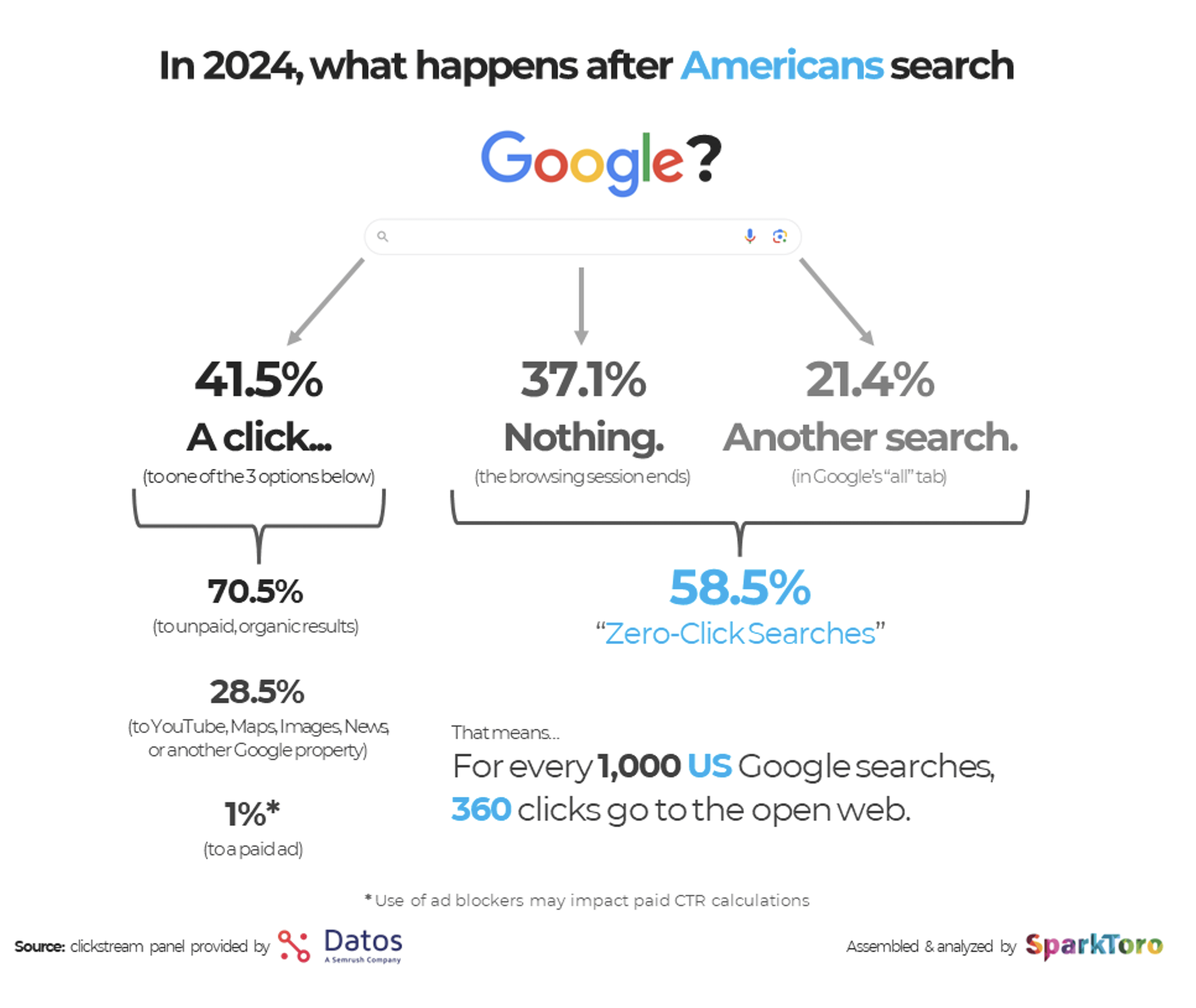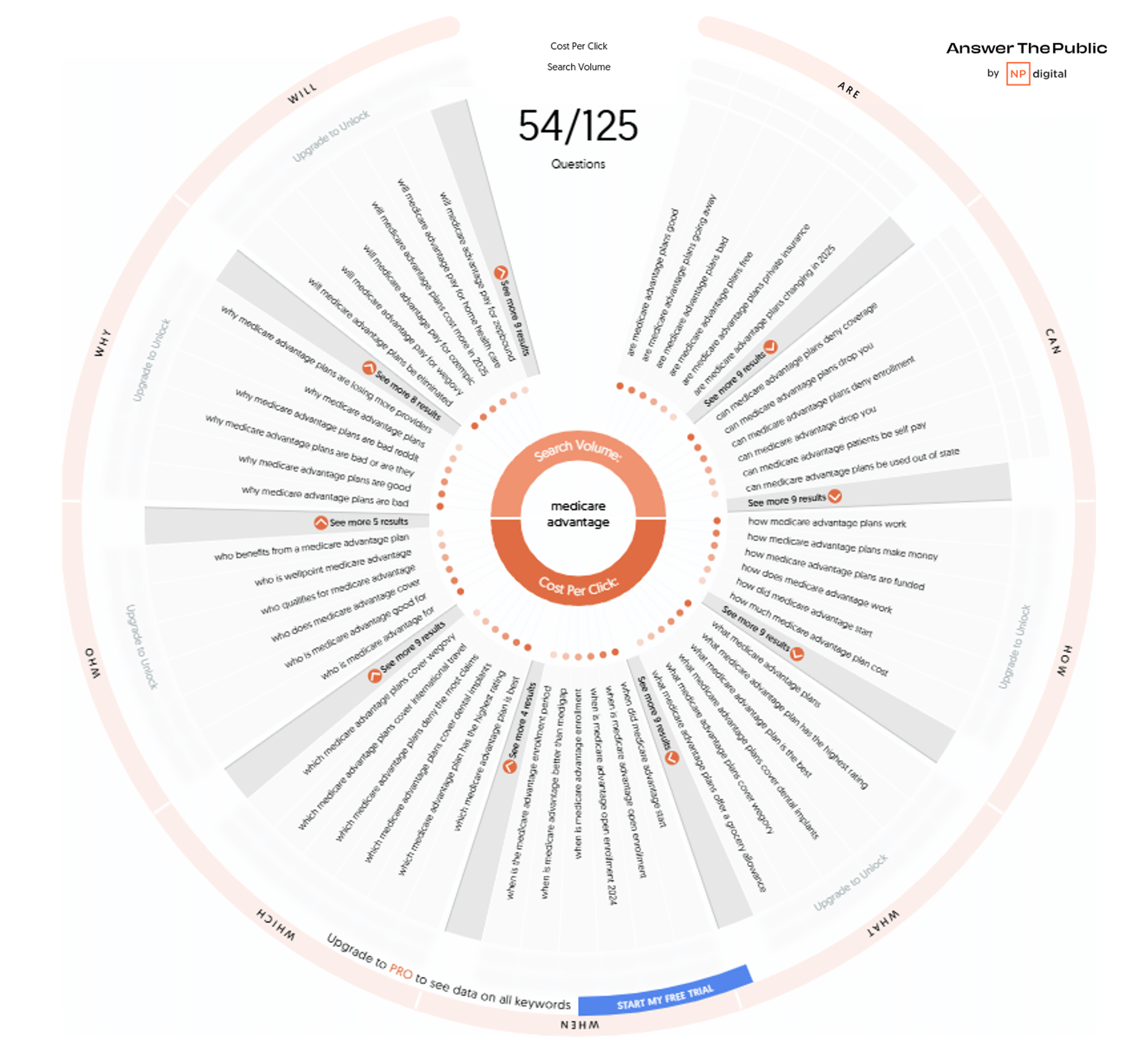How Zero-Click Searches are Transforming Search Engine Marketing
Justin Stauffer Digital Direct Marketing, Marketing Analytics, Trends and POVSearch engine marketing is in a state of transition. As search engines evolve into answer engines, the emergence of zero-click searches (ZCS) present both challenges and opportunities for marketers, including those within the health insurance sector.
Understanding zero-click searches
ZCSs allow users to obtain information directly from the search engine results page (SERP) without visiting a website. This trend is fueled in part by generative AI and voice search (Hey Google/Siri/Alexa), which help initiate search queries, typically in the format of a question. These tools are capable of providing answers to questions without any form of a visual interface.
ZCSs are also commonly found within SERPs in the form of AI-generated content. Examples include featured snippets and AI Overviews. They feature answers that are compiled from one or more websites and displayed at the top of search results, above paid ads and organic search results. (This is sometimes called “position zero.”)
For example, I asked Google, “What are the different parts of a Medicare plan?” Google transcribed my voice query, determined the context of my message, and then compiled the results from multiple sources. The results were displayed within the SERP. The original sources for the generated content are shown, but AI Overview doesn’t require a user to visit any other websites to see the information they’re seeking, as shown below.

Example search query and AI Overview response.
Implications for search engine marketing
A recent report indicates that nearly 59% of searches end with the user not clicking on anything.

One of the primary KPIs of search engine marketing has always been a trackable click — to a website, a landing page, etc. With answers now readily available on SERPs, the click is lessening in importance, resulting in significant implications for search engine marketing, namely:
- Decreased visibility: Search listings can move up or down in rank and may fall behind Google’s AI-generated content. As a result, based on the context of the query, visibility of traditional listings may diminish.
- Decreased Click-Through Rates (CTRs): With fewer clicks on ads, conversion potential and overall return on ad spend (ROAS) may be negatively impacted.
- Higher Cost-Per-Click (CPC): Increased competition for visibility in a zero-click environment may drive up CPCs, straining budgets and complicating Return on Investment (ROI).
Understanding this shift is crucial for marketers aiming to capture — and ultimately convert — their audience. While Google continues to further integrate AI into its search platform, the search engine still remains a critical source for research and education, regardless of how users receive their search results.
The search engine continues to roll
While generative AI tools like ChatGPT are gaining traction, these tools don’t currently monetize search queries in the same manner as Google (or Bing). As a result, bidding strategies within paid search remain relevant, even though a shift in strategy is likely needed.
Despite the rise of ZCSs, Google assuredly will not allow its paid advertising model to falter. Throughout their existence, search engines have relied on relevancy. Irrelevant SERPs will result in users looking for information elsewhere.
Over the course of 2024, Google has taken great strides to improve relevancy within their search engine. In fact, after launching AI Overviews in May 2024, Google has continued to upgrade its content policies to ensure AI-generated data displayed within SERPs is factual and can be easily sourced. Within industries like health care, accurate information is critically important.
Google is also in the process of allowing marketers to place paid ads within AI Overview and Lens. Also look for continual A/B tests for paid search ads, thus preserving the advertising ecosystem that marketers rely on. Bottom line: As consumers’ methods of searching evolve, so will paid search ads.
Fortunately, there are a few ways search marketers can ensure their ads perform optimally despite changing user behaviors.
1. Optimize ad copy
Structure your ad content to answer your audiences’ questions. Sites like AnswerThePublic can graph the most common questions asked for specific search queries. By incorporating questions like these into your search strategy, you may be able to more effectively support consumers when they’re performing research or comparing specific products or services.

Graph from AnswerThePublic shows common audience questions for the query, “Medicare Advantage.”
2. Focus on high-intent terms
Focus on incorporating high-intent search queries into your strategy. For health insurance marketers, intent within search may come in the form of terms that involve “compare,” “enroll,” “sign up,” and “buy.” Google’s keyword planner and third-party tools like SEM Rush and SpyFu can help identify terms to use within your ad campaign.
Additionally, revisit your list of negative keyword phrases to minimize unnecessary clicks from top-of-funnel searches. To most marketers, using negative keywords is nothing new — but considering the context within messaging, it may warrant additional attention.
3. Utilize ad extensions
Ad extensions can help occupy more SERP real estate and make your ads stand out against results from AI Overview. For example, sitelinks appear below your ads. They’re links that can be used to direct individuals to other conversion-related pages. You may also consider call extensions to increase phone-based leads by featuring your phone number within the ad.

This online ad features a sitelink ad extension.
4. Focus on user experience (UX)
UX can help influence your quality score, CPCs, and conversion rates. Some considerations include: PageSpeed, mobile-friendliness, ad relevancy, and website security. See this blog post about landing page optimization for more information.
Partner with DMW
As search engines continue to make enhancements and integrate new iterations of AI, marketers have to be increasingly innovative and update their strategies to stay ahead. If you need help maximizing the potential of your paid search campaigns, let’s chat!